Zola: How a road trip became a viral story of sex trafficking
- Published
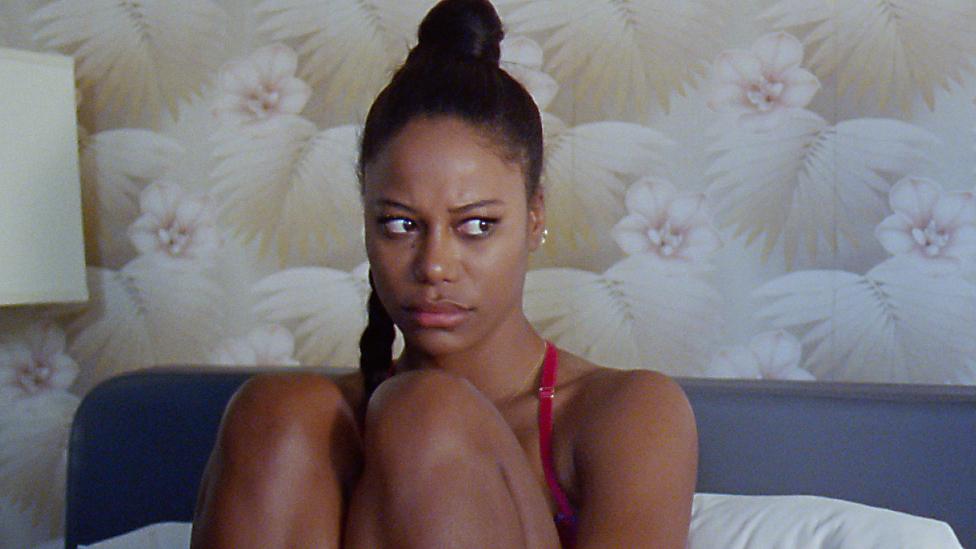
Taylour Paige, who was recently seen in Ma Rainey's Black Bottom, stars as Zola
It's a viral Twitter thread written by a teenager that simply became known to its thousands of fans as #TheStory.
Now, that string of 148 tweets, written in 2015 by 19 year-old Detroit waitress A'Ziah King, known as Zola, about a wild Florida road trip, has been made into a feature film, also entitled Zola.
Co-written and directed by film-maker Janicza Bravo and starring Ma Rainey's Black Bottom actress Taylour Paige, American Honey's Riley Keough and Succession star Nicholas Braun, the film is punctuated by the narration of Zola's tweets, as her version of her epic saga is related.
In the film, Zola, played by Paige, strikes up a friendship with a customer, Stefani, played by Keough, who cajoles her into joining her for a weekend of partying in Tampa, Florida.
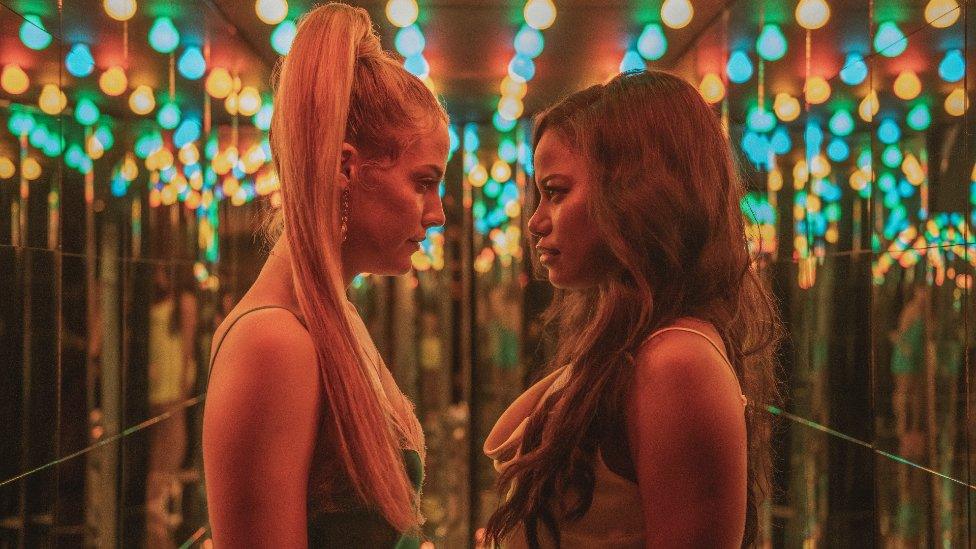
Riley Keough (left) stars as Stefani who persuades Zola to go on the Florida trip
What is supposed to be a lucrative weekend where the two women earn money by dancing in clubs ends with Zola being caught up in a dangerous world of sex trafficking.
Despite its serious undertone, the original story - now deleted on Twitter, but preserved elsewhere on the internet - was told with such humour that the thread went viral and was retweeted by celebrities including Missy Elliott and Solange Knowles. Bravo, the director, also became aware of it - and immediately saw it as a film.
"I'm not on Twitter, and I see that as a good decision on my part," she explains, "but I am on group chats, and I remember back in October 2015 looking at my phone and there were suddenly 100+ messages.
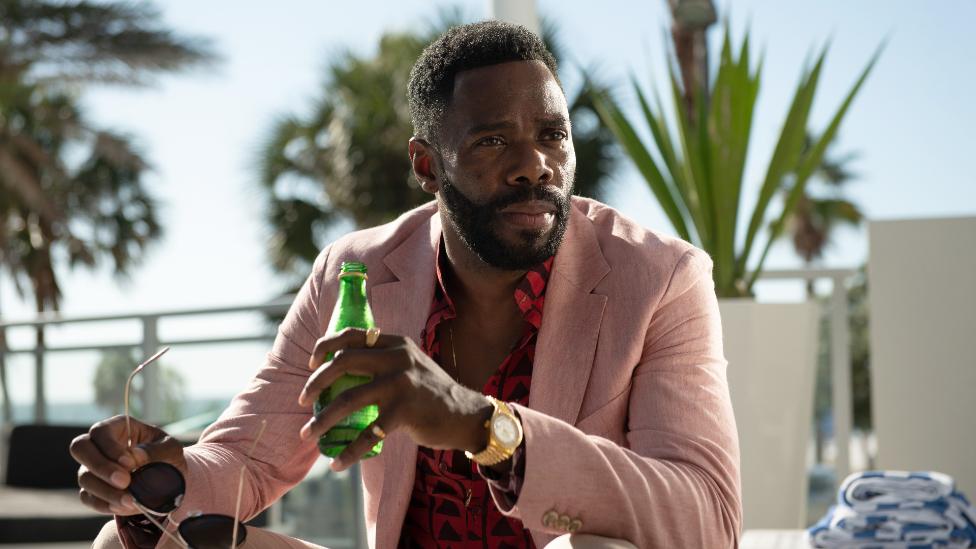
Euphoria star Colman Domingo plays the sex trafficker X
"When I looked at my phone and saw what they were talking about, I realised that what happened on Twitter had been electric. It was a theatre experience of sorts - Zola was on a stage telling a story, the audience was interacting, and she was invigorated by that response.
"I loved her voice. I'd never heard a voice like that before and I tend to have a visual experience. I know right away if I want a script if I start seeing pictures. That's my entry point - photos first and then my gut - and that's what happened here."
Zola's tale was also dubbed The Thotyssey by fans, comparing her road trip to Tampa with the ancient Greek writer Homer's epic poem The Odyssey, which Zola's co-writer Jeremy O Harris thinks is fitting. "As Homer wrote the first epic poem of the Western Canon, A'Ziah wrote the first big poem of the digital era," he says.

Taylour Paige (L) and Riley Keough with director Janicza Bravo (R)
However, some people on Twitter questioned Zola's story. Zola herself admitted in an interview with Rolling Stone magazine, external that she had exaggerated some details for dramatic effect, and two of the others involved, including Jessica Swiatkowski, the inspiration for the character of Stefani in the film, also told their version of events on social media, which did not portray Zola in such a flattering light.
But Bravo says getting to the impartial truth of what actually happened on that road trip isn't the point of the movie.
"I think we're all guilty of rewriting our narratives and we tend to paint a better picture of ourselves in them," she says.
"I never really personally got into the validity of the story because Zola had weaved together something so brilliant, and the film is not journalism, it's not documentary, it's narrative told in the documentary style.

"Riley Keough and Nicholas Braun's characters also told their versions of the story on Reddit , externaland Facebook. If you put all three of the stories together they were almost identical, except of course, all of us has to be the star of our own movie. But there was a great deal of overlap in terms of the events."
Bravo also questions why, given studies estimate that nearly five million people worldwide are victims of forced sexual exploitation, the reaction on social media was to dispute Zola's story.
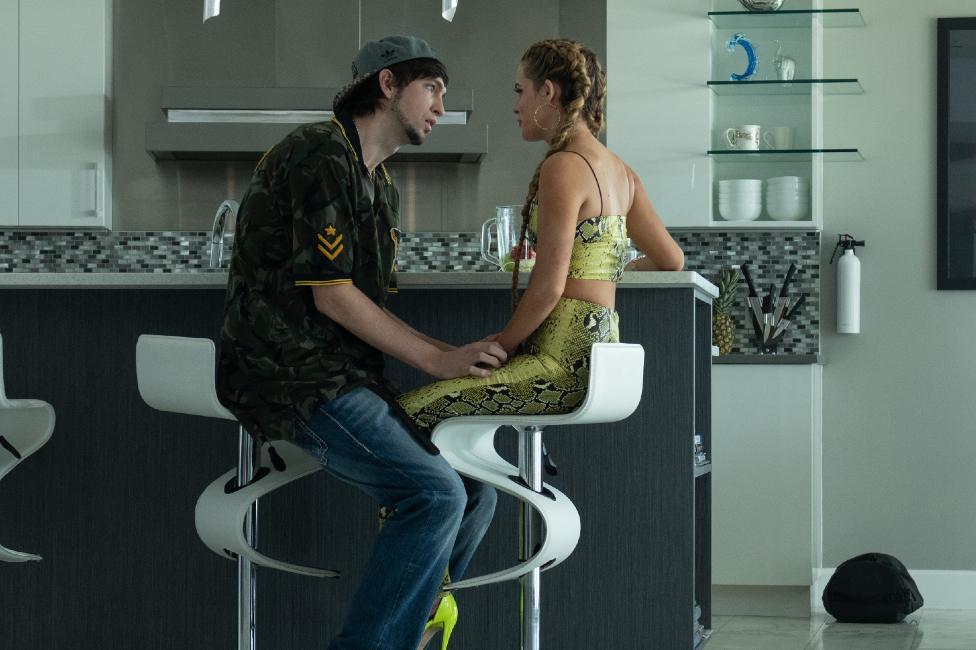
Both Nick Braun and Riley Keough's characters told their own versions of the story online
"Almost every article I read about Zola at the time questioned the validity of her story. It was fascinating because regardless of how larger than life the story is, the events described in it are pretty traumatising.
"And I thought, surely there's a multitude of things to question, including having a conversation around sex work and sex trafficking? Yet these topics didn't sound the loudest notes."
Bravo says she wanted Zola's approval for the film, and the writer ended up as an executive producer. Zola said at the time of tweeting that she had told the story humorously so that "people who probably wouldn't want to hear a sex trafficking story (would) want to be part of it, because it was entertaining".
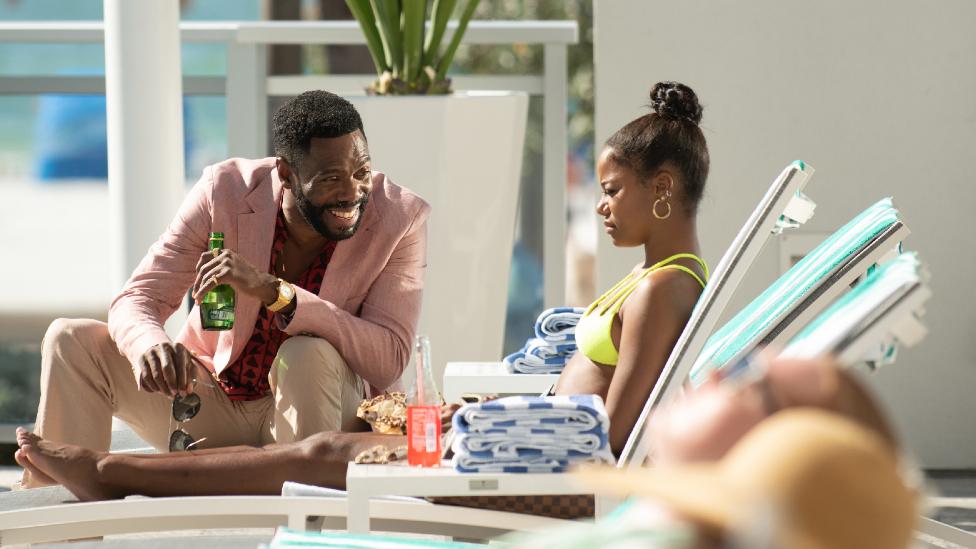
In the film script, Zola proves more resourceful than the women's male trafficker by charging Stefani's clients treble his fees.
"I wanted to portray sex work as work, and I wanted to also tell a story about women who had found themselves in sex work, to some degree, on their terms," Bravo explains.
"I wanted to clearly identify when that work was on their terms. The real Zola who told the story imbued that work with so much respect and I hadn't seen that before, and I hadn't seen those women not played tragically.
"There is a tragedy here, but the tragedy is when they lose their agency, the tragedy is not the work, it's the loss of will and I wanted to make the distinction. Through and through Zola is constantly telling us what she will do and will not do.
"The film is also very funny, and I think the benefit of comedy in this space might be that humour brings down some barriers and allows the audience to talk about it afterwards.
"But I hope there's respect for these women, there's a version of these characters that are not considered, people living on the fringes, and I am hoping that some of these women and men could be seen differently."
Zola is released in UK cinemas on 6 August.